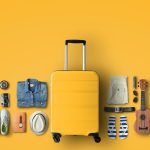Before Your Trip to Veitnam
Before setting off on your journey to Vietnam, it’s essential to be well-prepared to make the most of your trip. Understanding the local culture, customs, and practical considerations can significantly enhance your travel experience. This guide provides a thorough overview of what you need to know and prepare before embarking on your adventure.
From essential travel documents and health precautions to cultural etiquette and local currency, we cover all the crucial aspects to ensure a smooth and enjoyable visit. With these tips, you’ll be ready to navigate Vietnam with confidence and fully embrace the rich experiences that await you.
The Weather in Vietnam
Vietnam has a tropical climate with three distinct regions: the north, central, and south, each experiencing different weather patterns. Understanding these variations can help you plan your trip effectively.
In the north, the climate is divided into four seasons: spring (March to May), summer (June to August), fall (September to November), and winter (December to February). Spring and fall are mild and pleasant, summer is hot and humid, and winter can be quite chilly, especially in the mountainous areas.
Central Vietnam experiences a tropical monsoon climate. The hot season from March to August sees high temperatures and humidity. The rainy season from September to November brings heavy rains and occasional typhoons. Winter from December to February is cooler and drier, making it an ideal time to visit.
Southern Vietnam has a more consistent tropical climate with less variation in temperature. The hot season from March to May is followed by the rainy season from June to October, which brings daily heavy showers and high humidity. The dry season from November to February is cooler and more comfortable.
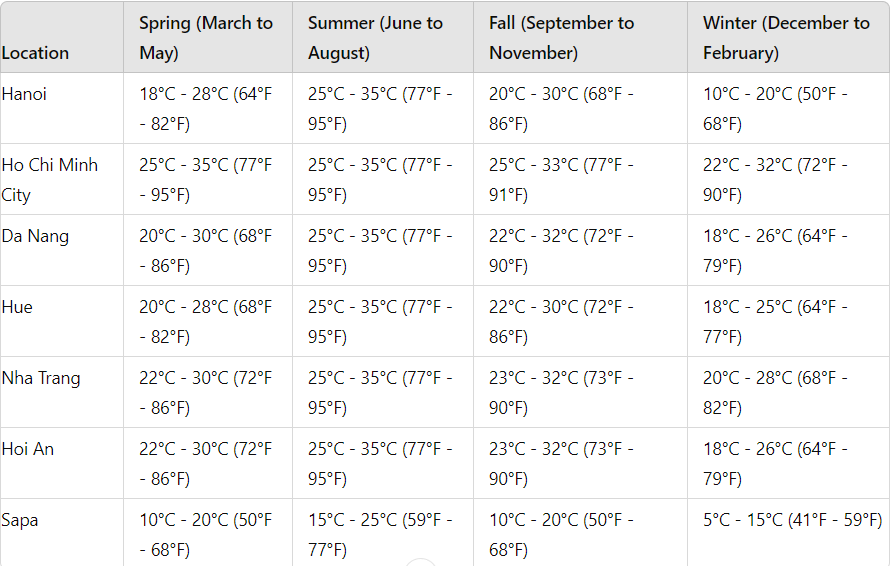
How to Dress in Vietnam – Seasonal Considerations
Summer
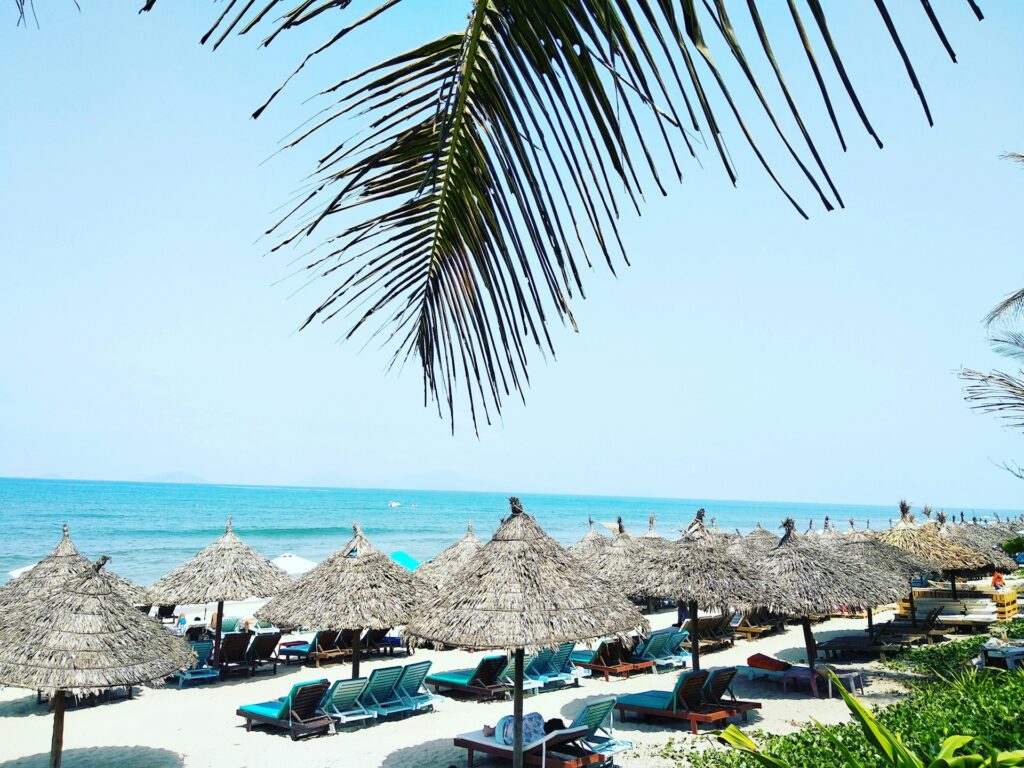
Vietnam’s summer is characterized by hot and humid conditions, so prioritize lightweight, breathable fabrics like cotton and linen to keep cool. Choose loose-fitting clothing to allow air circulation and stay comfortable. Accessories such as sunglasses, a wide-brimmed hat, and sunscreen are essential for protecting yourself from the intense sun and UV rays.
Fall
Fall brings a transition to cooler, but still mild weather. Layering becomes important, so consider packing a light jacket or sweater for the cooler mornings and evenings. While daytime temperatures remain relatively warm, having a few layers on hand will help you adjust to the varying conditions. Comfortable, breathable clothing remains ideal for daytime activities.
Winter
Winter in Vietnam, particularly in the northern regions, can be quite chilly and damp. Prepare by packing warm, layered clothing, including sweaters, long pants, and a sturdy coat. In addition, a scarf and gloves will be useful for added warmth during the cooler evenings and early mornings.
Spring
Spring features mild and pleasant weather, making it an ideal time for comfortable travel. Light, breathable layers work well for the varying temperatures, while a light jacket or cardigan can provide warmth during cooler evenings or unexpected rain showers. This season is generally favorable for outdoor activities and exploring.
The Currency in Vietnam
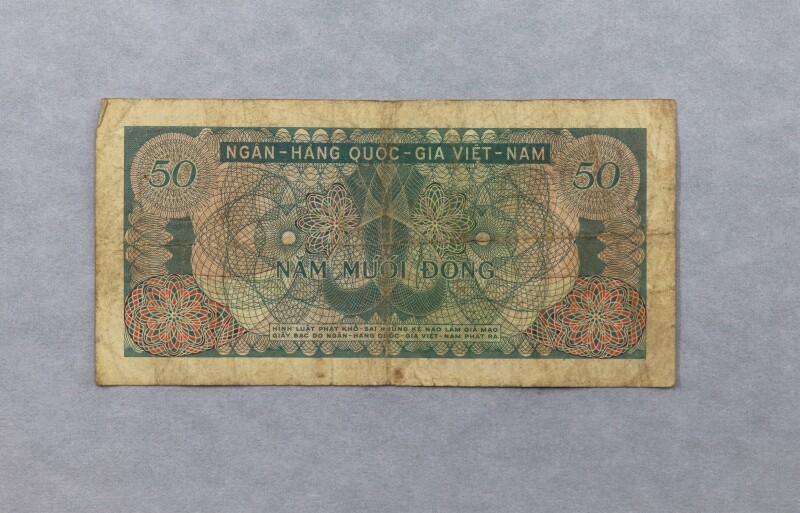
The official currency in Vietnam is the Vietnamese Dong (VND). It is advisable to carry some local currency for small purchases, as not all places accept credit or debit cards, especially in rural areas. ATMs are widely available throughout the country, and major credit cards are accepted in most hotels, restaurants, and larger stores. When using ATMs, be aware that there may be fees for foreign card transactions, so it’s a good idea to withdraw larger amounts to minimize charges. Additionally, keeping some smaller bills and coins on hand can be useful for things like street food, market shopping, and transportation, where exact change is often appreciated. Having local currency ensures smoother transactions and a more convenient travel experience.
Which Currency Can Tourists Use in Vietnam?
Where to Exchange Money in Vietnam?
You can exchange money in Vietnam at banks, exchange bureaus, hotels, and airports. Banks offer the best rates, but exchange bureaus and hotels provide convenience and extended hours. In larger cities like Hanoi and Ho Chi Minh City, exchange bureaus are readily available and offer competitive rates. Airports also provide exchange services, but the rates may not be as favorable. For safety, avoid exchanging money with street vendors or unauthorized agents. Always count your money and request a receipt after any transaction to ensure accuracy.
Tips for Exchanging Money in Vietnam
When exchanging money in Vietnam, it’s crucial to use official exchange services like banks or authorized exchange counters. Avoid using street vendors or unofficial sources as they may offer unfavorable rates or counterfeit currency. Always check the current exchange rate before making a transaction to ensure you are getting a fair deal.
Additionally, it’s advisable to carry small denominations of Vietnamese Dong (VND) for everyday transactions, as larger notes might be difficult to use for small purchases. Keep your receipts from currency exchanges, as you may need them for any future transactions or refunds.
The Language in Vietnam
The official language of Vietnam is Vietnamese, a tonal language spoken by the majority of the population. Besides Vietnamese, regional dialects like Northern, Central, and Southern Vietnamese are also spoken. English is widely taught and used in business, tourism, and government, with higher proficiency in major cities such as Hanoi, Ho Chi Minh City, and Da Nang. However, in rural areas, English may be less common. Knowing basic Vietnamese phrases can be helpful for everyday interactions and can enhance your travel experience by connecting more with the local culture.
Vegetarian, Vegan, and Gluten-free Eating in Vietnam
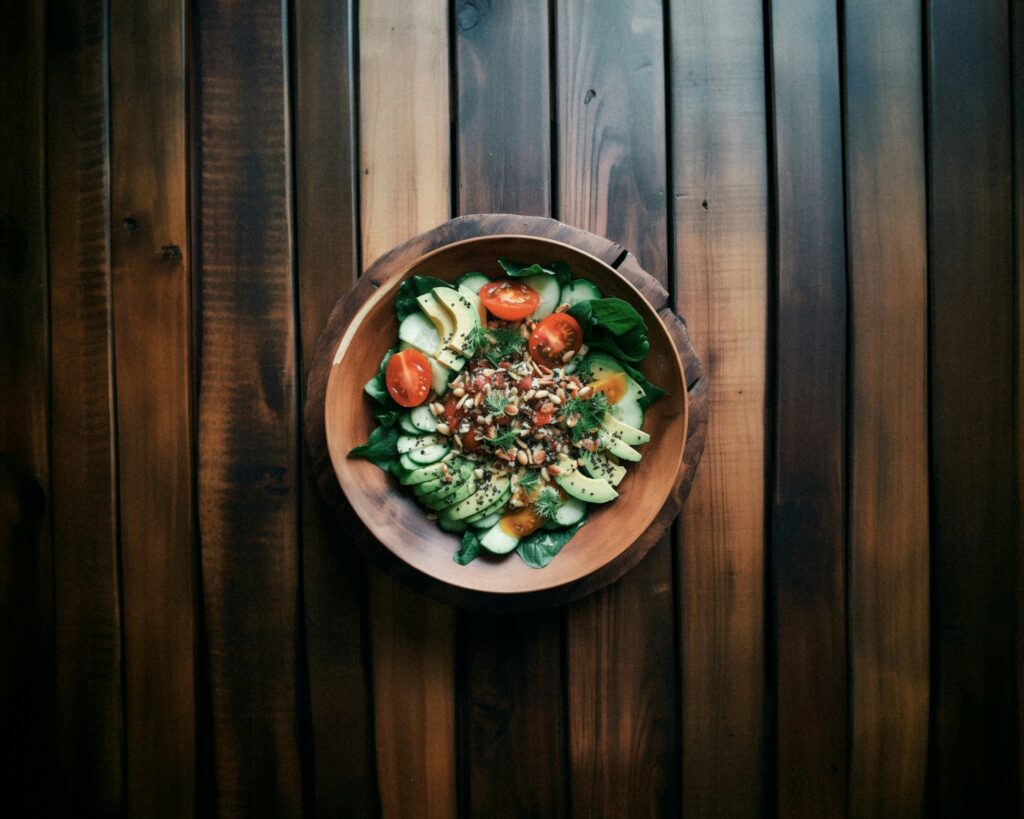
Vietnam offers a diverse and rich culinary scene that can cater to vegetarian, vegan, and gluten-free diets. Vietnamese cuisine naturally includes many dishes that are plant-based or can easily be adapted. For vegetarians and vegans, dishes like “pho chay” (vegetarian noodle soup), “goi cuon” (fresh spring rolls), and “com tam chay” (vegetarian broken rice) are popular choices. Tofu is widely used, and fresh herbs and vegetables are staples in Vietnamese cooking.
For gluten-free options, rice is a major component of the Vietnamese diet, making it relatively easy to find suitable meals. Rice noodles, rice paper rolls, and dishes served with rice are abundant. However, soy sauce and some sauces may contain gluten, so it’s important to communicate your dietary needs clearly. Learning a few key phrases in Vietnamese or carrying a translation card can be helpful. Many restaurants, especially in larger cities, are becoming more aware of dietary restrictions and can accommodate special requests.
The Necessary Documents and Emergency Contacts
Visa and Passport
Before traveling to Vietnam, ensure your passport is valid for at least six months from your date of entry. Depending on your nationality, you may need a visa. Many nationalities can apply for an e-visa online for stays of up to 30 days. For longer stays or other purposes, you’ll need to apply for a visa in advance at a Vietnamese consulate or embassy. Always check the latest visa requirements to avoid any travel disruptions.
Travel Insurance
You must have travel insurance with a minimum medical, evacuation and repatriation coverage of US$50,000 covering all applicable dates of travel with the Tour Operator. This insurance must cover personal injury and emergency medical expenses. On the first day of each Tour, a representative of the Tour Operator will verify that you have sufficient insurance in place. You are strongly recommended to extend your coverage to include cancellation, curtailment, and all other expenses that may arise as a result of loss, damage, injury, delay or inconvenience while traveling. You acknowledge that insurance coverage is not included in the cost of any Tour offered by the Tour Operator, and you are required to obtain separate coverage at an additional cost. It is your responsibility to ensure that you have sufficient coverage and comply with the terms of the applicable insurance plans. You are responsible for advising your insurer of the type of travel, destination(s) and activities included in your booking so that the insurer may provide appropriate coverage.
Travel Vaccines for Vietnam
It is recommended to get vaccinated for Hepatitis A, Hepatitis B, Typhoid, and Japanese Encephalitis before traveling to Vietnam. Additionally, ensure your routine vaccinations, such as MMR (Measles, Mumps, Rubella) and Tetanus, are up to date. Depending on the regions you plan to visit, consider malaria prophylaxis as well.
Essential Emergency Numbers in Vietnam
In case of emergencies, here are some important contact numbers:
- Police: 113
- Fire Department: 114
- Ambulance: 115
- Tourism Hotline: 1900 1009
Do’s and Don’ts in Vietnam
Do’s
- Respect Local Customs: Show respect for Vietnamese culture and traditions. Dress modestly, especially when visiting religious sites.
- Learn Basic Vietnamese Phrases: Knowing a few words like “hello” (xin chào) and “thank you” (cảm ơn) can go a long way in showing respect and courtesy.
- Bargain Politely: Bargaining is common in markets, but always do so with a smile and respect.
- Use Both Hands: When giving or receiving something, especially money or gifts, use both hands as a sign of respect.
- Remove Shoes: Take off your shoes before entering someone’s home or a temple.
- Respect the Elderly: Show deference to older people in social settings.
- Carry Cash: While credit cards are accepted in many places, having cash on hand is essential, especially in rural areas.
- Use Reputable Transport: Opt for reliable taxi services or rideshare apps for safe and fair-priced transportation.
Don’ts
- Don’t Touch Heads: Avoid touching anyone’s head, as it is considered the most sacred part of the body in Vietnamese culture.
- Don’t Point Feet: Don’t point your feet at people or religious objects, as this is considered disrespectful.
- Avoid Public Displays of Affection: Public displays of affection are frowned upon in Vietnamese culture.
- Don’t Raise Your Voice: Keep your voice down in public to avoid drawing unwanted attention.
- Don’t Discuss Politics: Avoid discussing sensitive topics like politics, especially in public.
- Don’t Use the Left Hand: Avoid using your left hand to pass items or eat, as it is considered unclean.
- Don’t Litter: Dispose of trash properly to show respect for the environment and local community.
- Avoid Flashy Displays of Wealth: Be modest in your attire and avoid flaunting expensive items to prevent unwanted attention.
What The Pack for Vietnam?
Travel Adapter for Vietnam
When traveling to Vietnam, it’s essential to bring the correct travel adapter to ensure your electronic devices can be charged and used without issues. Vietnam primarily uses Type A, C, and G power sockets. Type A has two flat parallel pins, Type C has two round pins, and Type G has three rectangular pins in a triangular pattern. The standard voltage is 220V, and the frequency is 50Hz. If your devices are not compatible with this voltage, you may also need a voltage converter. It’s advisable to bring a universal adapter to accommodate different types of plugs and ensure you can charge your devices wherever you stay.
Wifi Access and Mobile Connectivity in Vietnam
Wifi access in Vietnam is widely available, especially in urban areas and tourist destinations. Most hotels, cafes, restaurants, and even some public spaces offer free wifi, providing reliable internet connectivity for travelers. In major cities like Hanoi and Ho Chi Minh City, wifi speeds are generally good, making it easy to stay connected, work remotely, or share your travel experiences online.
For mobile connectivity, purchasing a local SIM card is a cost-effective way to stay connected during your trip. Major mobile network providers in Vietnam include Viettel, Vinaphone, and Mobifone. These providers offer various prepaid plans with data, call, and text options. SIM cards can be easily purchased at airports, mobile shops, or convenience stores. Ensure your phone is unlocked before purchasing a local SIM card. Additionally, 4G coverage is extensive in most parts of the country, ensuring you have access to fast mobile internet even when traveling outside major cities.
In Your Suitcase
- Lightweight clothing suitable for the tropical climate
- Comfortable walking shoes
- Raincoat or umbrella, especially during the rainy season
- Swimwear for beach destinations
- Sun protection (hat, sunscreen, sunglasses)
- Insect repellent to protect against mosquitoes
- Basic medical kit including any necessary prescriptions and probiotics
- Travel adapter for Vietnamese outlets (Type A, C, or G)
In Your Daypack
- Refillable water bottle
- Portable charger for electronic devices
- Maps and travel guides
- Snacks
- Hand sanitizer and wet wipes
- Video camera and smart phone







